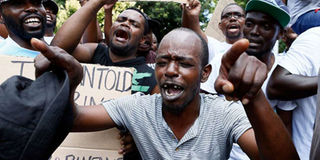Zimbabwe court rules against internet shutdown over demos

Protesters sing during a demonstration outside the Zimbabwean Embassy in Pretoria on January 16, 2019, following the announcement of a petrol price hike and an internet shutdown. PHOTO | PHILL MAGAKOE | AFP
What you need to know:
- State Security Minister Owen Ncube ordered service providers to switch off the internet as security forces responded to protests ignited by fuel price increases.
- David Halimana, the lawyer representing the complainants, said that, in terms of the law, only the state president has powers to order an internet shutdown.
- Authorities have launched a large scale crackdown on suspected protestors and organisers of the nationwide strike.
HARARE,
The Zimbabwe High Court ruled Monday that government had no powers to order a shutdown of the internet which was imposed as protests swept across the country last week.
State Security Minister Owen Ncube ordered service providers to switch off the internet as security forces cracked down on protesters following the wave of violent anti-government demonstrations ignited by fuel price increases.
Handing down judgement in a case brought by human rights lawyers and journalists, Judge Owen Tagu said "it has become very clear that the minister had no authority to make that directive."
David Halimana, the lawyer representing the complainants, said the ruling meant "mobile network operators are with immediate effect required to give full and unrestricted access of internet to all their subscribers".
Mr Halimana said that, in terms of the law, only the state president has powers to order an internet shutdown.
UNIONIST'S ARREST
Authorities have launched a large scale crackdown on suspected protestors and organisers of the nationwide strike.
A union leader who backed the strike was arrested on Monday as the opposition reported five lawmakers had been detained in recent days.
"ZCTU (Zimbabwe Congress of Trade Unions) Secretary General Japhet Moyo has been arrested at Robert Mugabe International Airport," Kumbirai Mafunda, spokesman for the Zimbabwe Lawyers for Human Rights group, told AFP.
He stands accused of plotting to overthrow the government in the wake of protests that rocked the country last week.
Police told him they will be "charging him with subverting a constitutionally elected government," the lawyers said in a statement.
Mr Moyo appeared on a video clip posted on the ZCTU's Twitter account last week urging workers to stay away from their jobs in protest at the more than doubling of fuel prices.
He is the latest of high-profile activist arrested after the strike turned into nationwide protests with some rioting and looting.
PAST CASES
Leading Zimbabwean activist Evan Mawarire was arrested last week.
He is in custody on charges of subverting the government and inciting violence, apparently after backing the national strike on social media.
The main opposition Movement for Democratic Change (MDC) party said five of its lawmakers have been arrested so far.
A member of parliament Rusty Markham "has been arrested this morning," MDC spokesman Nkululeko Sibanda, told AFP, adding "there are several unaccounted for leaders and MPs".
President Emmerson Mnangagwa was on his way back home after cutting short a foreign tour on Sunday saying he wanted his country "calm, stable and working again" as criticism grew over a brutal crackdown in response to protests.
At least 12 people were killed and 78 treated for gunshot injuries over the last week, according to the Zimbabwe Human Rights NGO Forum, which recorded more than 240 incidents of assault and torture.
SUPPRESSION
The opposition MDC party has accused the government of trying to suppress information about the security operation, in which the authorities are said have arrested more than 600.
The situation was calm in the country on Monday, according to various witnesses, but roadblocks manned by both the military and police were mounted along several roads.
Business partially re-opened in cities and towns, with some banks, shops and fuel stations operating.
Public and privately-run commuter buses plied their routes freely but some schools, especially in the working class suburbs, remained shut.
In the small town on Chinhoyi, north of Harare, witnesses said one primary school opened and when soldiers arrived during morning assembly, teachers fled, some jumping over the perimeter wall.
Parents went to fetch their children.





